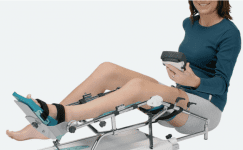Articles
Signs & Symptoms of a Rotator Cuff Injury

Like many types of injury, a rotator cuff injury should be diagnosed and treated as soon as possible. If you’ve experienced this injury before, you probably know what to look for; but if you haven’t, we’ll help you recognize the symptoms so you can seek treatment and get on the path to recovery.
Symptoms of Rotator Cuff Injury
Acute rotator cuff injuries can be identified by sudden severe pain in the shoulder joint, often associated with a tearing sensation, and difficulty moving the arm. While acute injuries do happen, especially with athletes, chronic rotator cuff injuries are more typical. Some of the most common symptoms of a chronic rotator cuff injury include:
- Difficulty moving the shoulder through its full range of motion
- A deep, dull ache in the shoulder joint
- Difficulty sleeping or finding a comfortable position while lying down
- Weakness in the affected arm
The primary risk factor for chronic rotator cuff injuries is repeated motion in the shoulder joint, especially with the arms raised overhead—for example, repeatedly swinging a tennis racquet to serve the ball, or keeping the arm elevated while hammering nails. The risk of injury also increases with age.
When to Go to the Doctor
If you have suffered an acute shoulder injury, see your doctor as soon as possible to get a proper diagnosis and treatment recommendations. If you think you have a chronic rotator cuff injury, see your doctor whenever pain persists for more than a few days or worsens. If you are unable to do activities you normally do, seek medical attention so you can start treatment and recovery.
Be aware that some shoulder pain can be related to heart problems. If you have pain that is not associated with difficulty moving the shoulder joint, call your doctor immediately.
Treatment Options for a Rotator Cuff Injury
In very few cases, a rotator cuff injury can heal on its own with rest, cold therapy, compression, and physical therapy to bring you back to full range of motion. If persistent pain is an issue, you can take over-the-counter medications to help alleviate it. Some doctors also recommend steroid injections into the shoulder to reduce inflammation. A full tear in the rotator cuff tissues might require surgery.
Rest
If your injury is caused by repetitive motions, temporarily stop doing the activities that cause the pain and contribute to the injury. Allow your body to rest so it can apply more energy to the healing process. You might want to use a sling to help prevent the shoulder from moving, but be careful not to use a sling for too long because it can ultimately lead to stiffness and muscle atrophy.
Cold Therapy
Apply ice packs or use a cold therapy system to deliver therapeutic cold to the tissues inside the shoulder joint. This may help reduce inflammation (even if you don’t see swelling) and dull the pain you are feeling. Therapeutic cold also aids the healing process by slowing down cellular metabolism so damaged tissues have a better opportunity to repair themselves.
Compression
Compression helps reduce and prevent swelling. Active compression does this even better by helping to increase the flow of fluids and pumping excess fluid away from the shoulder joint. Active compression also promotes healing by increasing blood flow to damaged tissues.
Physical Therapy
Maintaining range of motion, increasing strength in the supporting muscles, and improving flexibility may all contribute to a faster injury recovery. A physical therapist can also teach you exercises that may help with future rotator cuff injuries.
How to Prevent a Rotator Cuff Injury
Preventing an injury in the first place is always the best approach. While you can’t always avoid an unexpected fall or accident,, you can take several steps to help avoid a chronic rotator cuff injury:
- Use proper form during athletics and daily activities
- Warm up and stretch before athletic activities
- Avoid repetitive motions when possible and take breaks as needed
- Perform daily strengthening and stretching exercises
A rotator cuff injury can be very disruptive to your daily lifestyle. Preventing this type of injury is always ideal, but when it does happen, be prepared with a home treatment plan that includes rest, ice, compression, and elevation. Get started with a physical therapist as soon as you can to make your recovery time as short as possible.
http://blog.gameready.com/blog/signs-symptoms-of-a-rotator-cuff-injury


